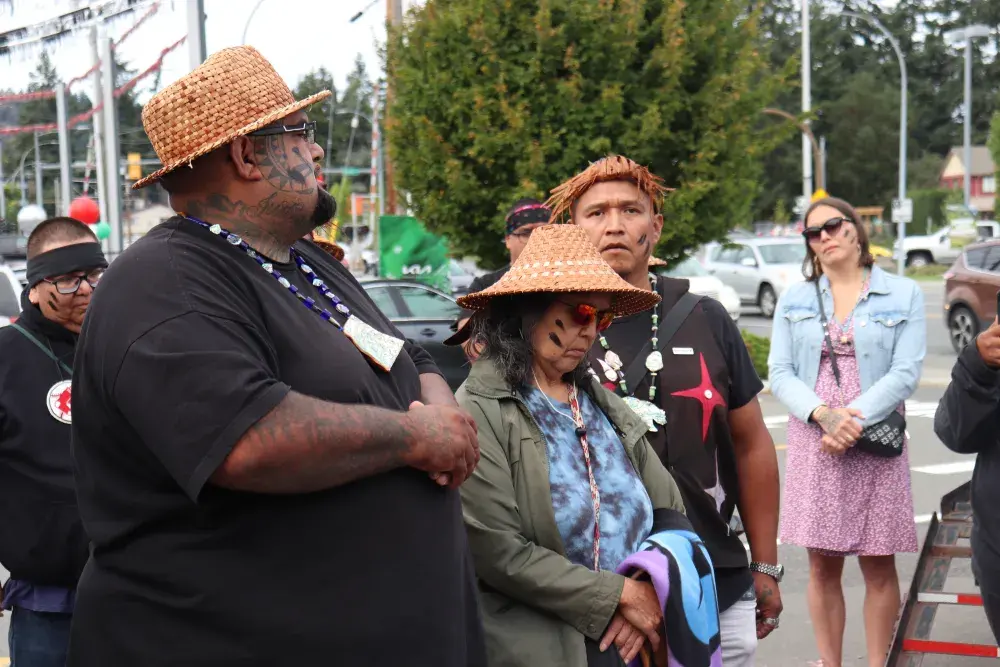In July right before Pamela Webster was about to embark on the Tribal Journeys to Muckleshoot, Washington, she drove from Victoria to Nanaimo to look for a new vehicle at Harris Kia, leaving the dealership that day with a Chevy Impala and a financing contract.
When Webster initially purchased her vehicle from the dealership, she felt in a rush after having skipped brunch and dealing with the news of a loss. It wasn’t until the next day when Webster looked through her contract that she noticed additional costs included in the purchase that amounted to thousands of dollars she wasn’t aware of.
“I looked through that contract and of course there [were] costs there that [weren't] really mentioned verbally,” Webster recalled. “I mean they did talk about stuff and they didn’t, of course, mention the costs affiliated with these items.”
The salesperson who sold her the vehicle was due to leave the company a week after selling the car to Webster.
“It was very troubling after the fact,” said Webster. “Things [were] already said and done.”
She returned twice on her own to attempt to find a resolution with the dealership. Webster recalls each time meeting with different managers and said that they wouldn’t negotiate.
“When I went in with my son to attempt to do a negotiation, we weren't even given a chance,” said Webster, adding that during this meeting her son had used a cultural approach in support his mom. “We were just totally dismissed, that’s the way I felt that happened.”
After nearly a month, Webster was able to meet with one of the owners of the company and received a full refund.
“[The owner] right away apologized for what happened,” said Webster, adding that he also presented Webster and two family members who came with her with blankets, using some Nuu-chah-nulth words when speaking with her.
They were prepared this time, shared Webster, they wanted to approach this in a better way.
“When it was time to say goodbye, he did say, čuu,” said Webster. “That kind of noticeable homework was done, I could see.”
Webster was able to receive a full refund and returned the car back to the dealership, though she was not able to get back into her old vehicle which she had initially traded in. She noted that her old vehicle was sold and the dealership said they would look into getting her vehicle back for her, but have yet to respond.
“It was still in pretty decent shape,” she said. “I didn't want to actually look into another vehicle for a while after that experience.”
Webster chose not to do a financing situation when she purchased a vehicle from another dealership.
“I think it was the best situation, considering,” said Webster. “I did lose out a little bit. I didn't get my car back.”
For Tony Harris and Dave Bare, owners of the Harris Kia dealership, they shared with Ha-Shilth-Sa that the situation was a misunderstanding and were hopeful to find a resolution.
“Anything that would be part of the deal would be spoken about and written down,” said Bare in an interview with Ha-Shilth-Sa, adding that he was not in the room at the time of the purchase.
When Webster initially expressed her concerns of the additional costs, Bare shared that the dealership offered to refund the warranties and protection packages that day.
“We would like to be able to resolve any customer's complaint, and we're especially sensitive to a situation like this, where we've got cultural sensitivities and things that we need to do our best to communicate effectively so that everybody feels heard, and everybody's experiences are valid,” said Harris. “We want to make sure that we operate in a way that honors that, because that’s how we feel.”
According to an article published by Making Auto Easy, when purchasing a vehicle through a dealership, some fees are optional, while others are mandatory.
Mandatory fees include shipping and freight costs (roughly $2,000), air conditioning tax issued by the Canadian government ($100), a pre-delivery inspection fee (amount determined by dealer and can be included in shipping and freight fee), tire tax (roughly $20 to $30), provincial auto regulatory fees (varies depending on province), and DOC fees ($500 to $700 depending on vehicle).
Optional costs that may be offered are extended warranties, rust protection, nitrogen-filled tires, GAP insurance, undercoating, and VIN etching, reads the article.
“You must approve these purchases to be charged for them,” reads the Vehicle Sales Authority of British Columbia website. “The motor dealer must give you a copy of the sale or purchase agreement at the time the agreement is accepted.”
“Review every section of this document, including the back, and have the dealership fill in all areas or put a line through them,” the VSA website continues. “Don’t take signing this document lightly. Have terms you do not understand explained to you. Once it’s signed, the dealer can accept it, binding you to buying the vehicle.”
“It’s a lot of money you’re putting in, it’s a big-ticket item, just like a home would be,” said Webster. “You want to make sure you have everything in order to do that kind of purchase.”
“I am very happy that I was able to get out of that situation,” she added. “I think they were talking seven years for this finance.”
Webster also cautions people not to purchase a vehicle while in a state of vulnerability.
“Make sure to have some financial questions ready or be a little bit prepared by doing some research,” she said, adding that it’s okay to ask.
“Trust your instincts,” Webster added. “If it does not feel good then just leave and say, ‘no’ before signing anything.”



